Chris Nickson's Blog, page 8
November 23, 2022
Richard Nottingham…For Christmas
As we all know, that time is coming in a few weeks. Not my favourite season, but it’s going to happen regardless.
However, it does mean presents and books make great gifts. So please forgive a few weeks of shameless self-promotion ahead…
For the last few years I’ve focused to the Tom Harper and Simon Westow books – I’m working on the sixth book with Simon and Jane, and the big news is that my publisher has accept Rusted Souls, the 11th and final book in the Tom Harper series. It’ll be out next autumn.
Before those, though, was another series, the first of my published novels, with Richard Nottingham, Constable of Leeds, as the main character. His family were important in the books, especially his daughter Emily, and also his deputy, John Sedgwick.
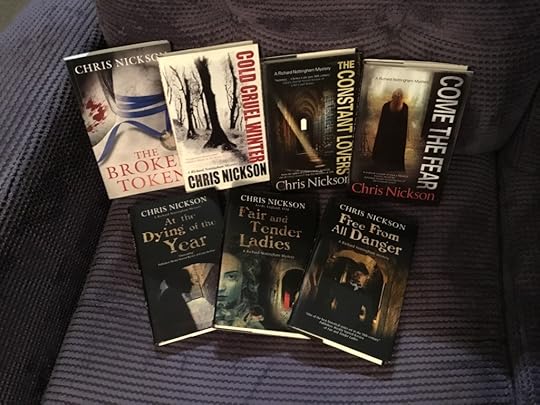
They’re set in Leeds, but in the 1730s, just as the town is grown wealthy off the wool trade. Well, the merchants are. For ordinary people, life is always a battle. It’s a small place, around 7,000 people, dominated by Kirkgate and Briggate.
Richard lives on Marsh Lane, crossing Timble Bridge, down near the Parish Church, to come to the jail. That’s by the top of Kirkgate, next to the White Swan on the corner of Briggate.
It was, perhaps, an unusual setting for a series of crime novels. But Leeds is my home. I feel it and I wanted to bring the place to life, to make readers feel they’d walked the streets, heard the voice, smell all the stink of life. All in the framework of a crime novel.
What many don’t know is that Richard Nottingham was real. He was the constable from 1717-1737, although it would be a largely ceremonial role in reality. He was a somewhat elusive figure in life. I spent time trying to track him down and wrote about it here – there’s just enough to be fascinating and make me want to known much more.


There are seven books in the series. Each one of them received a starred review from Publishers Weekly, which I’m told is very rare. Although virtually all are out of print in hardback, most are available in paperback. All are there as ebooks in every format. The Broken Token is also an audiobook (and one of the Independent on Sunday’s Audiobooks of the Year for 2012).
I have a very soft spot for Richard, and not just because he helped me into this fiction business. He’s a genuinely good man, someone I could wish to be. People still occasionally ask if I’ll write another with him. I won’t. At the end of Free From All Danger I left him happy. He deserves that.
If you haven’t tried him, please take a look. The ebooks are pretty cheap, and they’ll fill a dark winter evening. For those who are squeezed…ask the library; they should have them in stock to borrow.
November 14, 2022
The Kingdom of Elmet
Barwick-in-Elmet, Sherburn-in-Elmet. The Parliamentary constituency of Elmet and Rothwell.
Fine, but where was Elmet? You can ask the question, but nobody can give you an exact answer. A similar area to the old West Riding (which included much of South Yorkshire)? Somewhere from Leeds to Selby? The poet Ted Hughes believed its heart was in the Calder Valley. Something that’s recorded in the tribal hidage is that it was 600 hides, which is a value rather than geographical measurement. Even so, it was small.

It was a British kingdom that abutted Saxon ones, but it was also a forest, according to Bede. It might have existed before the Romans came. Some many possibilities, but so little fact.Certainly it had its own rulers. However, we know of very few people from Elmet. Two of them were warriors mentioned in great the Welsh epic, Y Gododdon: Gwallog ap Leenog (ap meaning son of) and Madog Elfed. There was also a king of Elmet named Ceredig ap Gwallog. Bede mentions that after Gwallog’s “subsequent kings made a house for themselves in the district, which is called Loidis ” – the first written mention of the area that became Leeds, at least in a very general sense.
Bede also mentions “the monastery the lies in Elmet wood” and it’s possible that might be a reference to the ancient church at Ledsham. The south date, which leads into the west tower, dates from around 700 CE (making it the oldest building in West Yorkshire), and much of the original nave survives.
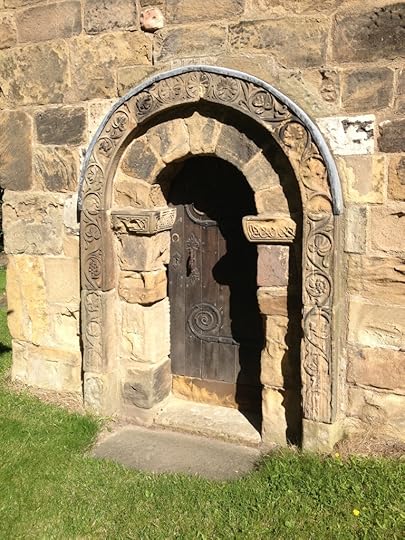
While there’s nothing to indicate Elmet’s origins, it seems virtually certain that it vanished somewhere after 616-17, thanks to Edwin of Northumbria, possibly by invitation, but it possibly by negotiation. Yet, as Bede shows, the Elmet name remained more than a century later.
It’s possible – but not substantiated – that it might have regained its independence after Edwin’s death and remained that way until Viking times, which might explain the names of the small towns.
Curiously, it received another mention in 1315 in a Florentine bill of sale for wool, where it’s curiously distinct from Leeds.
d’Elmetta (Elmet) 11 marks per sack
Di Ledesia (Leeds) 12½ marks per sack
di Tresche (Thirsk) 10½ marks per sack
de Vervicche (York) 10½ marks per sack.
I’m grateful to Lost Realms by Thomas Williams for some of the information here.
Some advertsing, I’m afraid. The holidays are coming, and books always make ideal gifts. If someone you like enjoys history and crime, why not buy them A Dark Steel Death, the most recent book in my Tom Harper series. They won’t be disappointed, I promise. Your local independent bookshop can order it or, you can find the cheapest price online here (with free UK shipping).
Thank you.

November 2, 2022
When Leeds Got Its Name
First of all, many thanks to those who came to the two panel events last week – nearly 100 of you in all. I hope you had a much fun as we did…
Ask the question “When was Leeds founded?” and every answer is going to be qualified with if and maybe and possibly.
It’s impossible to come up with a vague date, let along and exact one. But…if Bede’s Ecclesiastical History contains some truth, King Edwin built a church in Loidis in the early 600s – which was sacked a little later by Penda.
Now, Loidis could refer to a part of the British kingdom of Elmet, and Ledsham (part of the church there is ancient) and Ledston. But (a small word doing a lot of work), it’s believed that Loidis means ‘people who live by the river,’ which would be more likely to mean Leeds. If so, there would already have been some kind of settlement here, large enough to warrant a church.
It means, too, that Christianity had arrived, although the pagan Penda would interrupt that for a few years – he was defeated the battle of Winwaed, which might have been in Whinmoor, somewhere near to what’s now the big Arium council nursery in the 650s. You can still find a street or two named for him between Stanks and Whinmoor.
Again, we don’t know when Leeds first got a church. It was probably made of wood, and later rebuild, more solidly and lastingly, in stone. Nothing like the building we know today, or even the one the preceded it. It would have been far more modest in these Saxon times. No pews. Maybe a stone bench built into the west wall for those who couldn’t stand.
Leeds was also a parish, and it became a large and influential one, although it might not have begun quite so grandly. Certainly by Norman times it covered 32 square miles, taking in not only the village, but a host of surrounding communities.

We know about the Vikings arriving, in York from 866, if not earlier. Was there much pillaging in Leeds? Little evidence of it, and recent digging indicates they preferred East Yorkshire to the West Riding overall (no surprise, as the landscape is very reminiscent of Denmark). But they were here, they settled, intermarried.
In the 10th century, Leeds stood on the edge of two kingdoms, a cross point, which elevated its status. There were also fives crosses standing outside the church. Not preaching crosses, because the time for those had passed. These were memorials to important people. They were carved and would have been covered in plaster and brightly painted; probably the only splash of colour in Leeds. Along with Christian imagery, there’s also a representation of Wayland the Smith from earlier times, a sign that old and newer religions could co-exist. What remained of the crosses was found in the call of the Parish Church when it was being torn down and rebuilt in 1838. Enough fragments remained to assemble a single cross, which now stands in the church.

Leeds might have hosted a saint in the 940s, by which time is was very much part of the Danelaw and under Viking control St Cathroe, or Cadroe, might have crossed from the kingdom of Cumbia to the kingdom of the Northmen here, where he was escorted to York to meet King Eric. Eric’s wife was supposedly Cathroe’s sister. However, Eric Bloodaxe was not the king in York at the time, and his wife was supposed to be Norwegian. On top of that, the crossing point is named as Loidam Civitatem, which evidently can be read as either Leeds or Carlisle.
While there are precious few artefacts from the Viking era, their presence here remains in some of the words we use every day, like beck, gate (street), kirk, and many more.
The legal administration was through the wapentake, more or less equivalent to the Saxon hundred. One was in Morley, the other in Headingley, called the skyrack, or shire oak. An ancient oak stood across from the pub of that name (outside the Original Oak) until it finally died in 1941.
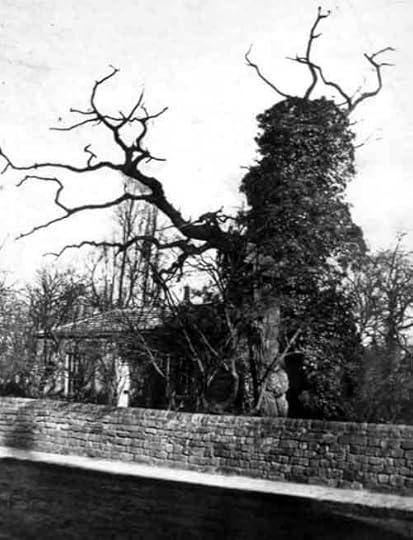
After the Vikings, of course, came the Normans…and Loidis became Ledes (probably pronounced as two syllables, it would have sounded similar to today’s name for the place). By then, Leeds had a church, where it stands now, a tithe barn, mill, communal over, and somewhere between thirty and fort families living on the only street – Kirkgate.
I hope you’ll remember that my new book, A Dark Steel Death (set in 1917, not early Leeds) is out for you to buy or borrow from a library. Thank you.

October 25, 2022
Very Early Leeds
A warning.
Much of this is smoke and mirrors. Hint and rumour.
Are you prepared? Right then, now…
Leeds. We know it, right? It’s where many of us live, one of the biggest cities in the North of England. The best place on earth.
The last part is true, and yes, Leeds is a city, but that happened not quite 130 years ago, a flash in the pan of history.
Do we know Leeds? We might think it’s always been here, a solid part of the country. But the first mention of a place that might be Leeds doesn’t come until the 730s, when the Venerable Bede writes about the area of Loidis.
Even by the time of the Domesday Book, it was a village, a large hamlet, really, with 35 families, about 200 people. But it did have a church and a priest, giving it higher status than many other villages.
Wind the clock back, though, and things grow murky. Pure fog, in fact.
If the story of Leeds has an origin, it’s in Malham Cove, where the River Aire rises. It nurtures Leeds, the artery to the coast and all the places beyond. It was here long before anyone dreamed about Briggate, even before the Armley hippos – three of them excavated in the gyratory.
However, little sign of humans from before the Bronze Age have been discovered in Leeds. A flint scraper in Ireland Wood, dated to the bronze age. Bonze chisels in Roundhay, a bronze axe in Hunslet.
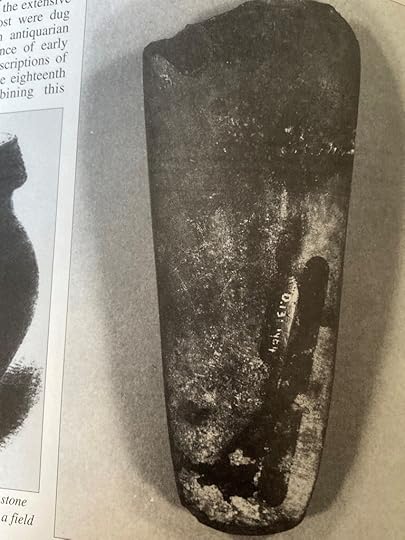
An urn under Briggate (discovered in 1745) with burnt bones.
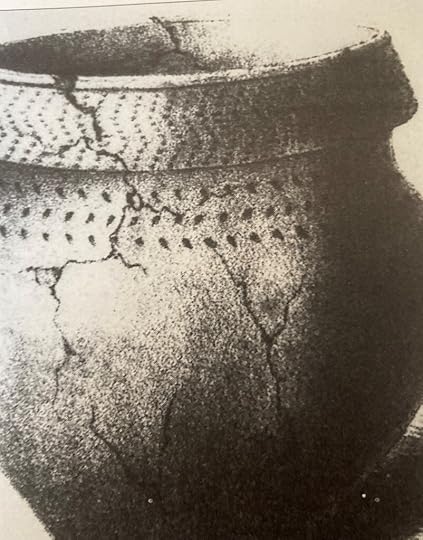
Possibly some burial mounds on Woodhouse Moor. They’re all isolated finds, however, no sign of a settlement – athough the technology to search for one didn’t exist back then.
Some signs of Bronze Age settlement and querns for grinding corn were discovered not far from the old Cookridge Hospital, and a few things at Ledston, a village 10 miles east of Leeds (which along with Ledsham, fits into that Loidis root name with Leeds). But nothing that close.
It’s believed there were earthwork defences built around Leeds – Temple Newsam, Gipton, Chapel Allerton and Woodhouse Moor; some believe that the name Rampart Road might be an atavistic reference.
Nothing to indicate a any buildings close to the river, although the waterway would probably have been in regular use. The area has been dug over and built on so much in the last few centuries that any signs are long since gone, in a time before we even knew what to look for.
It bring us to the Romans. Were they here? Did they have a settlement? We don’t know. Possibly Leeds is Cambodunum, the fort that exist on the Roman road from Tadcaster to Manchester. Leeds first true historian, Ralph Thoresby, speculated it might have been on Quarry Hill, although even by his time, it has been dug over and built on so much, it was impossible to tell. But part of the area was once known as Wall Flats, which some feel might refer to the wall surrounding a fort.
There are some artefacts from the greater Leeds area: a stone sarcophagus in Chapel Allerton (now sitting on a mound outside St. Matthew’s church there (when dug up, it was closed, but only held two bones – I write a short story about it in Leeds, The Biography). Another burial in Hunslet. An altar, and coins. But nothing to show any kind of settlement.
The road very likely did pass through Leeds. Work in the early 19th century uncovered a road of sorts just south of the river, leading to a ford.
It’s all tantalising, but so much is speculation. To all intents and purposes, Leeds, Loidis, Ledes, didn’t exist until Saxon times.
At that point we hit firm evidence.
Next time.
I’m duty bound to remind you that my new book in out, A Dark Steel Death, featuring Tom Harper and set in 1917 against the backdrop of the home front in the Great War. Ask your library to stock it, or if you can, please buy it yourself. Or even both. Thank you.
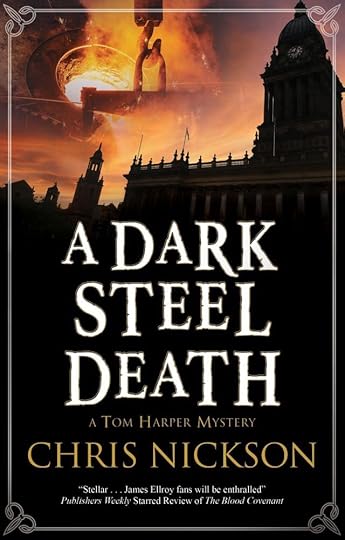
October 4, 2022
The Goldsmith – A Simon Westow Story
The note was short: Meet me outside the Moot Hall tomorrow at seven in the morning.
Jane read it twice and set it aside.
But she was there, wrapped in her heavy green cloak with the hood pulled over her hair. She stamped her feet against the February cold and waited for Simon.
He arrived with the final toll of the church bell for the hour, a smile on his face as he said, ‘Come with me.’
Why? What did he want? He knew something. She followed quickly, curious to find out.
No more than a few yards. He stopped by one of the stone buildings of Middle Row, a tailing of workshops behind the Moot Hall, leading up Briggate. They’d been empty for a few years. Another week or two and all this would be pulled down, along with the hall, making space to erect a new Corn Exchange.
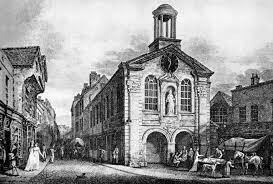 The Moot Hall with Middle Row behind
The Moot Hall with Middle Row behindSimon produced a key and unlocked the heavy old wooden door of one of the workshops. No telling how long these had stood here. As Simon pushed the door open, she could smell the mustiness and the age of the place.
‘What is it?’ she asked.
‘It used to belong to a man named Arthur Mangey.’
‘Who was he? Nobody’s been in there for a long time. Years.’
‘This was a long, long time ago. Let me light the lantern.’ It flared; he trimmed the wick and lowered the glass shade. ‘Come in and close the door. We don’t want the whole town knowing. Not yet.’
She gazed around. A small, barred window high in one wall, all the glass gone. Cobwebs pale and thick in the corners and draped across the walls. Dried leaves like a rug on the floor. A heavy wooden bench was the only furniture.
‘Constable Porter and I came in here yesterday. A chance to look around before it’s rubble.’
She didn’t understand. It was nothing more than an empty, derelict room. Stone on three walls, old wooden panelling on the fourth. No mystery, nothing to see. What was going to interest Leeds about that?
‘Watch,’ Simon said. He reached into the corner, moved something, and with a click, some of the panelling moved out like a draw. She drew in her breath with a gasp. ‘We found it by accident. Sheer luck.’ He held up the lantern and grinned. ‘Take a look.’
A dark, airless room that felt heavy with history. The lantern gave the only light. Another bench.
‘See?’ he asked.
Two pairs of shears on the wood, as if someone had put them down a few minutes earlier. Some small, tarnished chips of metal in a shallow tin bowl, black with age.
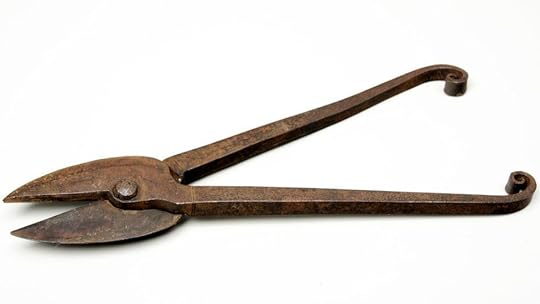
‘What are they?’ She kept her hands by her side, scared that someone might reach from the past and grab her if she tried to touch anything.
‘Silver. There was a coin. Porter took it and showed it to old Wilf Harrison. You know him, the jeweller on Vicar Lane. He says it dates back to Queen Elizabeth. More than two hundred years. Someone was clipping the edges from coins in here. A little bit of silver from quite a few, melt them down and you’ve made some money.’
Jane stared. Two hundred years. Beyond her comprehension.
‘Mangey was a goldsmith and silversmith. He was used to working with precious metals.’
‘It was true, then,’ Mrs Shields sighed as Jane told her what she’d seen.
‘What was?’
‘The story about the secret room. My grandmother heard it from her mother when she was a girl. She told me when…I suppose I was 10 or 11. We were walking down Briggate and passed Middle Row.’
‘Tell me. Please.’ She knew she sounded like an eager child, but she didn’t care.
‘This all happened over a hundred years ago-’
‘Simon said the coin is over two centuries old.’
Catherine Shields smiled. ‘Maybe it is, child, but I can only tell you what Grandmama said to me. Have you heard of the Leeds Mace?’
 The Leeds Mace
The Leeds MaceJane frowned. ‘No, what is it?’
‘It’s big, made from silver. Very beautiful. They bring it out for ceremonial occasions. It was made by Alfred Mangey. He worked in gold and silver, and he had that workshop on Middle Row. The one you were in this morning.’
‘If he worked in silver, why would he clip coins? He was already rich, wasn’t he?’
‘I don’t know, child.’ She reached out and stroked Jane’s arm. ‘People are greedy or maybe they want to do things for other reasons.’
‘How did anyone find out he was doing it?’
‘They did. At least, that’s what I was told. He was accused of forgery by someone and tried in York. There wasn’t any evidence, but they found him guilty.’
‘What happened then?’
Mrs Shields’ mouth tightened. ‘They hung him. Forgery was treason. He died a traitor. Evidently plenty of people thought he was innocent.’
‘But the room…’ Jane began.
‘Yes. That seems to end it all, doesn’t it?’
‘Yes.’
‘It won’t, though. You can guarantee that. People will always wonder if those things were planted by the man who accused him.’ She exhaled slowly ‘We’ll never know, will we?’
The story of Arthur Mangey is real. He was hung in 1696 after being accused of forgery by a shoemaker named George Norcross. But it was only during demolition of Middle Row in 1825 that the secret workshop was discovered.
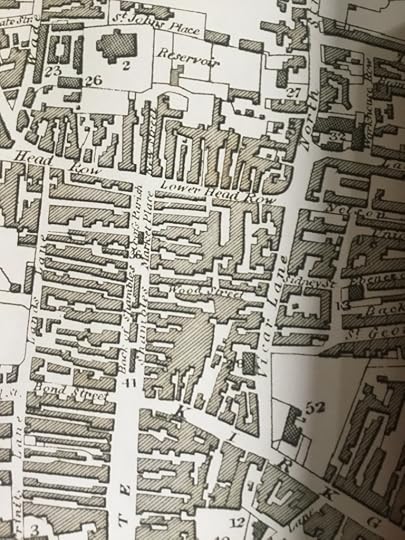 The Moot Hall and Middle Row in the middle of Briggate
The Moot Hall and Middle Row in the middle of BriggateHad Norcross planted the evidence? He’d never have been able to tell people about the secret room without giving himself away. We will simply never have a proper answer.
Forgive the small ad, but A Dark Steel Death has been out for a month now and I would be very grateful if you would buy a copy – if you can afford it – or ask your library to stock it. Once you’ve read it, please leave a review, good or bad, somewhere. Honestly, they all help. Thanks.

September 27, 2022
A Medieval Trip and Church Wall Paintings
It’s been several years since we went up to Richmond. Well before the pandemic, in fact. It’s a glorious market town in North Yorkshire with a spacious market square and a fabulous Norman castle, a perfectly picturesque place
After so long, it was definitely time to go again. But first, a detour. Someone had told my partner about Easby Abbey, fairly close to Richmond – you can walk there along the river in about 40 minutes. I’d never heard of the place, but a quick search showed it, with the ancient church of St. Agatha alongside. Everything free.
Pulled into the car park and had a quick chat with the man who’d been picking rubbish.
‘I’ll open it up for you,’ he said, and unlocked the church.
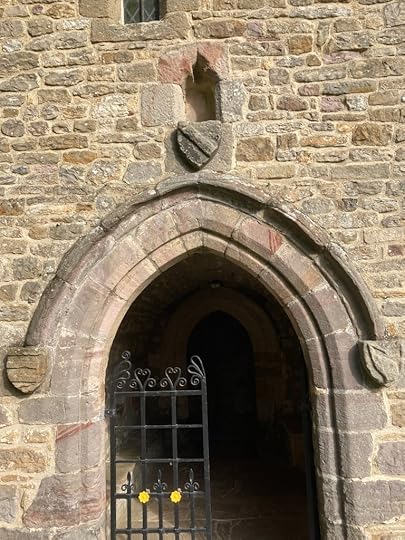 Church porch
Church porchStepping inside was a revelation. The earliest part dates from not long after William the Conqueror invaded, and the font is also Norman, as are the stone benches by it – the only early seating in churches.

But the true glory is in the medieval wall paintings. They’d been covered over, probably to protect them during the Reformation or Civil War, to be uncovered in Victorian times and restored in the 1990s.
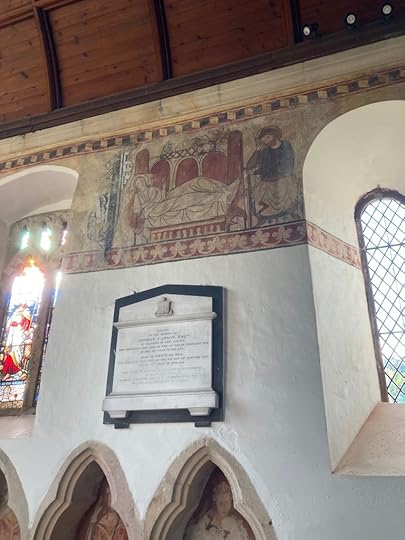 Nativity
Nativity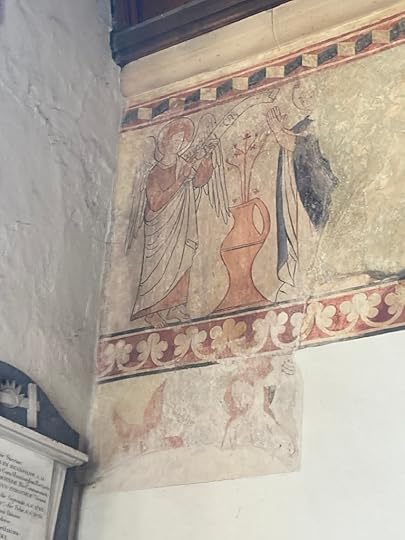 Annunciation
Annunciation
 Entombment
EntombmentIt’s estimated that the paintings date from around 1250 CE and tell different stories from the Bible. In those times, few could read, and the number that could read Latin – the only language in which the Bible was available here – was smaller still. Not even all priests would have been fully literate. Think of these paintings as holy comics or cartoons to tell the stories to the congregation.
 The Garden of Eden
The Garden of Eden The Seasons (note medieval dress)
The Seasons (note medieval dress)It also boasts a (not especially great) replica of the Easby Cross. The original was found in the walls during work almost a century ago and sold to the V&A Museum in London. However, the design is quite something, as is the age, going back to the late 700s, making it an excellent example of a Saxon cross and probably from the first church on the site.
 Easby Cross
Easby CrossThe church, restored a few times, is in a remarkably fine state; it really does take the breath away. After all, this isn’t even a church in a market town. It’s in an isolated hamlet. The name Easby derives from the Norse name Esi and the suffix by, meaning farm. At the time it was built, the entire parish held perhaps a hundred people.
It stands cheek and jowl by the ruins of Easby Abbey, which was built almost a century after the Norman part of the St. Agatha’s church. The abbey was a regional home to the Premonstratensian Order of regular canons, more widely known as the White Canons for the colour of their habits. They would have served as priests at St. Agatha’s and other churches all across the lands donated to them, and often distributed food where it was needed. They weren’t monks – their services was outside the abbey, not a contemplative life within the walls.
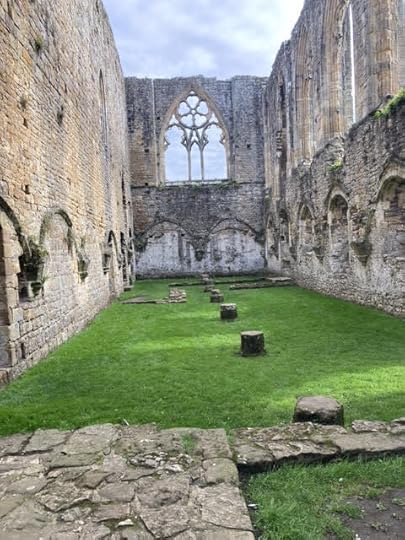 Easby Abbey Refectory
Easby Abbey Refectory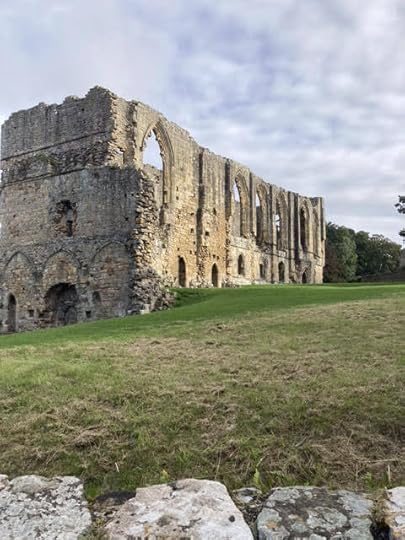
Even so, it’s a large place, one that lasted until the Dissolution in 1536, when those still there were granted pensions and sent on their way. The abbey slowly crumbled after that, and local would have taken stone for their own building projects. Yet even in the ruins there’s a sense of history; you can almost hear the voices of the canons.
 The Walk by Richmond Castle
The Walk by Richmond CastleWhat about Richmond? Great to see again, of course. It’s hardly changed, which is perhaps good. But the day was easily dominated by Easby.
Yes, a lovely detour to medieval times. But, please, I hope you’ll remember that A Dark Steel Death is now out.

September 20, 2022
Gipton Well And A Dark Steel Death
There’s a small place that plays an important role in A Dark Steel Death. Gipton Well, or Gipton Spa Bath House or Gipton Well and Waddington Bath, to offer the full titles, has its part in the book, although I’m not about to give you any spoilers on exactly what.
It’s one of about 26 wells or spas that once existed around Leeds (including the wonderfully-named Slavering Baby Well in Adel), but are mostly covered over or long forgotten, except in some local names, like Sugarwell in Meanwood).

It was originally built in 1671 by Edward Waddington. His grandfather, Alderman John Thwaites, owned Gledhow Hall, and the well was in the estate; on private property, in other words.

Like so many spas, the water which entered the bath house supposedly had healing properties supposedly head healing properties. Leeds historian Ralph Thoresby brought his son Richard there, attempting to cure him of rheumatism, and that involved sitting in the stone-built cold water bath. Lord Irwin was also a regular visitor.

Next to it was a room with a fire for undressing and warming up after a dip in the plunge pool, with a separate spring with water that could be drunk.

Thoresby referred to the place in his Ducatus Leodiensis, where he states the room with its fire is used “to sweat the patient after bathing”.
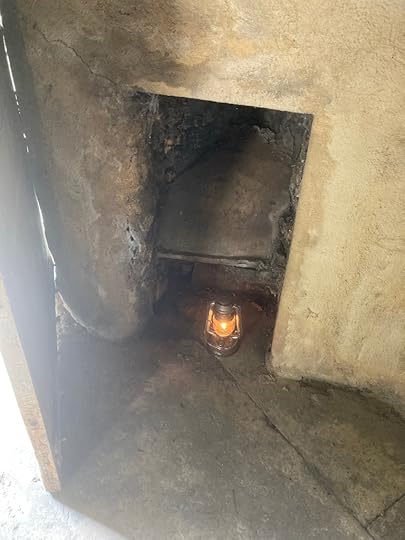
Edward Parsons also commended the place in his History of Leeds in 1834, and as late as 1881, Kelly’s Directory noted it was still in use, although now it’s “by people who live in the neighbourhood.”
Shortly after it had fallen into disuse and disrepair, to the extent that when the Honourable Hilda Kitson bought Well House Farm (again, the association with the well), which included the spa, she offered £200 to the Council to keep up the spa. The city bought the spa and the land around it in 1926, just after Gledhow Valley Road had opened a few yards away.
While the building has been there for a long, long time, no one seems sure when the walls around the pool were built; certainly much later. I’ve included them in the book purely for plot reasons.
The Friends of Gledhow Valley Woods (an excellent organisation who also provided much of the historical information from their website. Take a look at it here) have doner a great deal of work on the place, and now it’s surrounded by a metal fence to stop vandalism. However, it was open on Sunday as part of Heritage Open Days, and I was able to go inside and take some photos.
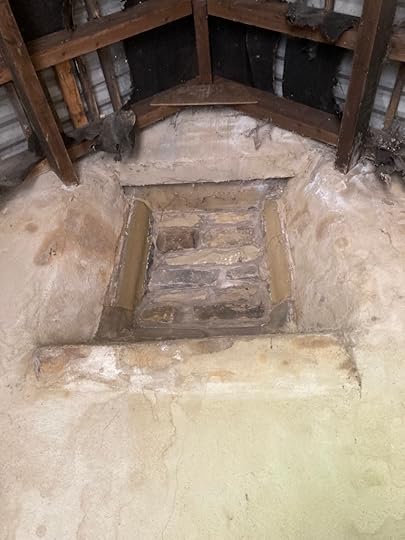
Tom Harper’s spectre didn’t fill the place. But after seeing the pictures you’ll be able to be there with him. And I’m sure you will read the book. Hopefully buy it, too, to make sure the final one in the series in published. Thank you.

September 14, 2022
When The Russian Revolution Came To Leeds
My newest book, A Dark Steel Death, takes place at the start of 1917. It’s a crime novel, but also a war novel – the war on the home front, where things were bleak. The Battle of the Somme the year before had killed and wounded so many of the young men from Leeds; it was said there wasn’t a street in the city that the fighting there hadn’t touch in some way.
But there was more going on the in the world. In Russia, the February Revolution (actually early March in the modern calendar) began to change everything in the country; November would cause a second, final rupture. In Britain, there was plenty of support from the labour movement, with an event held at London’s Albert Hall, attended by 10,000, with another 5,000 outside.
A second, known as the Leeds Convention, was set for June 3, organised by the United Socialist Council, made up of member of the British Socialist Party, the Independent Labour Party, and the Fabian Society.
I toyed with the idea of having that as the backdrop to a book set in 1917. Possibly one of the delegates might have been murdered, or someone protesting the convention. In the end, portraying the outside events in Russia felt a little too complex, and the idea held echoes of the backstory to Gods of Gold. I feel I made the right decision, but this remains a fascinating bit of Leeds history.
The intention was to hold it in Leeds’ Albert Hall – the big room in what was then the Mechanics’ Institute (now Leeds City Museum).
That was where the problems began. Unsurprisingly, the government didn’t want anything like this to happen in the middle of a war. They feared the idea of revolution could spread. They mooted the idea of banning it completely, but didn’t.
Instead, Leeds City Council refused to allow the use of the Albert Hall and ordered all hotel owners to refuse bookings from delegates, and they seemed to gladly comply. The police banned public meetings; anything to try and prevent things moving ahead (in the on, on the Saturday evening, the police asked hoteliers to sell room to delegates who had nowhere else to sleep). The press had no kind words for the delegates or the subject matter.

However, the Leeds Convention, as it came to be known, did happen. The organisers booked the Coliseum, where Prime Minister Asquith had spoken in 1908 (see The Molten City) and locals opened their homes to delegates.
The local papers came out against the convention, as did some of the national dailies.
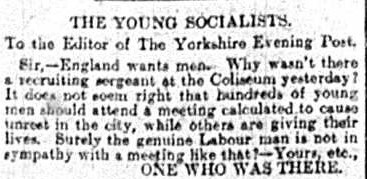
The Leeds Weekly Citizen offered a full account of the proceedings, also detailed in the book British Labour and the Russian Revolution (which was reissued in 2017). In the end, 1500 delegates debated four motions. Some big names appeared, including Ramsay MacDonald, Herbert Morrison, Sylvia Pankhurst and Bertha Quinn, who’d go on to become a Labour councillor in Leeds.

Everything went off peacefully, which was more than something else happening in the city over the same weekend – three nights of anti-Jewish rioting. A little about that in weeks to come, another lesser-known and awful incident in the city’s history.
A curious aside: a writer from Leeds was in Russia during and after it all, and came to known the top people. There were rumours that he might also have been a British Intelligence agent as well as a reporter. His name? Arthur Ransome (yes, Swallows And Amazons).
A Dark Steel Death won’t take you inside the Coliseum for the convention, but it will put you on the dangerous and deadly winter streets of Leeds at the start of 1917.
I’d be very grateful if you’d buy a copy or ask your library to stock it.

September 5, 2022
A Dark Steel Death And Gledhow Woods
At the weekend we walked in Gledhow Valley Woods. Nothing unusual in that. It’s not far from home, a pleasant stroll along Gipton Beck to the past the bridge that leads to the majestic sweep of the carriage drive and up to the old Gledhow Hall, and finally to the lake.
I know it well. We moved to a place right across from it when I was 11. My path to and from school was through the woods. I walked the dog there. Until I was 18 and moved away, I was in there every day. It was my playground, really.
So what, you think. We all have those.
Here’s where my history and my fiction intertwine. This ground is also where the climax of A Dark Steel Death (officially published tomorrow) happens. During World War I, Gledhow Hall became a Voluntary Aid Detachment hospital, one of many in Leeds treating casualties from the front, and…no, no spoilers.
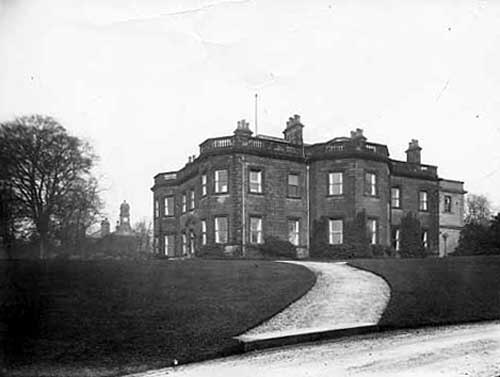
You’ll have to buy the book or borrow it from the library. But it plays out along the woods and all the way to Gipton Spa and Bath House.

Walking, it’s impossible not to remember things that happened to me there. Being chased through the woods when I was a teenager by a skinhead with an axe. More innocently, my dog Mickey chasing a goose down the long hill to the lake, only to find himself unable to stop in time and belly-flopping into the water.
Winter sledging.
A small dip in the lake myself – just one leg below the knee, but it was enough.
A trail to ride my bike. An open area to play football with myself, and all too often having to climb down into the back to retrieve the ball.
I was lucky, having so much green so close. Back then, I had no idea of the history, or the fact that that road along the bottom of the valley was less than 50 years old. It was simply the woods.
Now, I know so much more about the history. The stone bridge near the top of the hill known as Little Switzerland makes for a thin road.
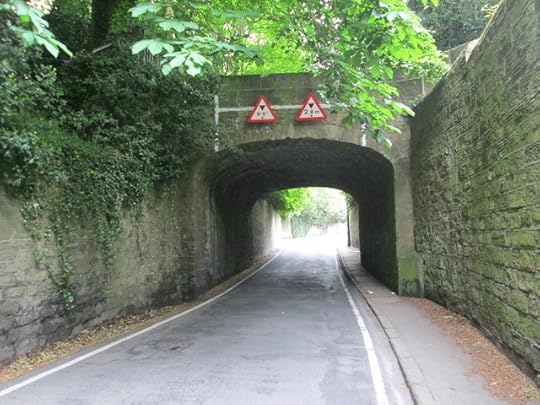
But it was constructed for one man – Jeremiah Dixon, who owned Gledhow Hall. You can see his initials and the date carved into the bridge.
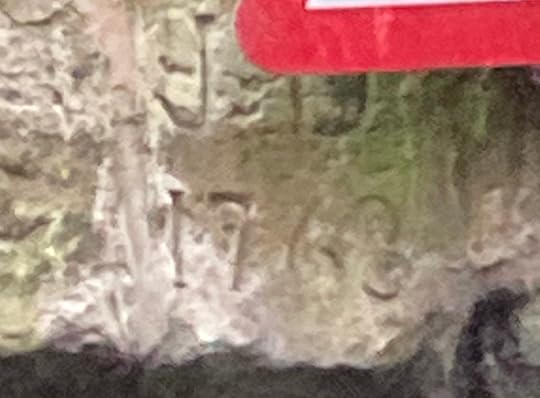
Like so much around Leeds, the land had once belong to Kirkstall Abbey, but with the Dissolution of the Monasteries, it was sold into private hands. Dixon bought the hall in 1763 or 4 and had the bridge built five years later (the date is carved in the sone) to connect his house to his pleasure gardens and ice house on the other side of Gledhow Lane. A later owner, James Kitson, would commission the breathtaking bathroom of hand-painted Burmantofts faience tile (this image doesn’t do it justice).
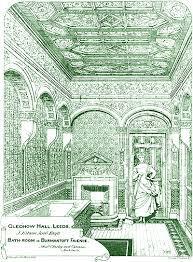
Early in the 1800s, Turner painted the hall, the lake and some of the grounds from the other side of the valley, giving the scene a sweetness and romance that captures some of the sweep. One hundred years later, Tom Harper would be pursuing a killer through there, the ground neglected and overgrown.
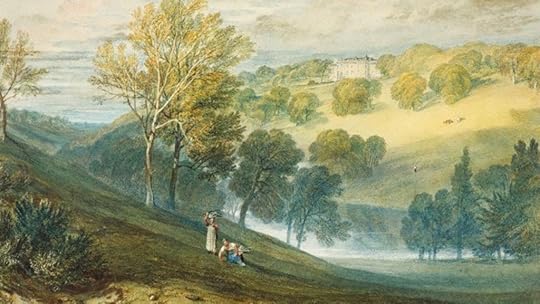
Several decades after that, I’d be watching my dog desperately try to stop himself tumbling into the water. Fast-forward even further and we’d be walking along, watching the ducks in the lake.
Time past and time passing, as a Yorkshire songwriter once sang.
Oh, and please don’t forget to buy your copy of A Dark Steel Death, please. Independent bookshops need your business. But this place has the cheapest price and free postage. Thank you.

August 31, 2022
A Few More Days…And Some Deals
It’s just a few days until A Dark Steel Death is officially published, and I have to say, I’ve been overwhelmed by the early reviews. It’s the kind of thing a writer always hopes for, but rarely manages.
I hope you won’t mind if I quote from them. It’s the kind of ego boost I need sometimes when I wonder why I’m sitting and typing words for a new books.
Publishers Weekly called it “superior” in a starred review noting that “Nickson does his usual superb job of evoking the period and balancing his lead’s professional challenges with personal ones. This entry reinforces his place in the front rank of historical mystery authors.”
If only…
The Go Buy The Book blog greatly enjoyed it, noting “the research is spot on, taking us back to wartime Leeds and introducing us to some of the real events of the time. Fact and fiction are merged really well, Chris Nickson, once again, delivering an engaging and tense plot where you really don’t know what is going to happen next.”
Booklist calls A Dark Steel Death “the latest in this successful series” and believes “this is a sure bet for the PBS crowd, who love their historical mysteries.”
Kirkus Reviews says it’s a gritty police procedural with well-drawn characters.”
And then there’s Yorkshire Bylines, which has an extensive review that makes me smile. “And that’s the thing with Nickson, he’s so good at telling a story that you don’t really have time to think about it when you start one of his books. You turn to the first page and you’re in, you’re hooked…offers facts wrapped up in fiction so readers don’t even realise they’re learning something. It’s fascinating to have an insight into a familiar place in an unfamiliar time.
Nickson makes the reader care about each character, even the villains, and so many of the issues raised in this book are relevant now, over a hundred years after it was set. It may be a crime thriller but it’s a social commentary too; for example, the reality of the war hero returning home with shell shock…Even when the situation is resolved it feels that it never really will be.
His female characters are strong and standalone, not just accessories to the male characters; from strong, proud Annabelle Harper, his suffragist wife who is struggling with her own health to his brave, sad daughter, Mary.”
Wow, that’s pretty much all I can say.
For those who read on Kindle, Amazon UK currently has it on sale for that. Not that I’d try to nudge you, but…you know.
And a few other UK Kindle deals on my books. My Lottie Armstrong and Chesterfield series are always £2.37, but here are a few more:
The Dead On Leave (one you might not know) is 99p
Free From All Danger is £2.79 (and £2.94 for the hardback)
Leeds, The Biography (short stories) is £3.98
The Leaden Heart is £4.98 (£5.24 for the hardback)
The Broken Token – my first published novel, with Richard Nottingham) is £4.99
Wish me luck for next Tuesday, please. And please, feel free to buy a copy to make sure my publisher will put out the final volume in the series. Or reserve it from your library, so they will buy it, and you can borrow it.
Thank you.



